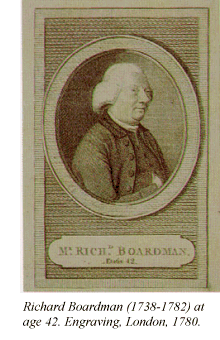Word of the Day
Laic (LAY-ik)
Of or relating to those who are not members of the clergy
Common clues: Not of the clergy; Secular ; Not of the cloth
Crossword puzzle frequency: 3 times a year
In religious organizations, the laity comprises all lay persons collectively. This can mean either any person who is not a member of the clergy or of any monastic order or, within such an order, a monastic who is not a priest (c.f., lay brother). In recent centuries, the term is often used more generally, in the context of any specialized profession, to refer to those who are not members of that profession.

John
Wesley sent two of his lay preachers, Richard Boardman (above) and
Joseph Pilmore, to the American colonies in 1769 to strengthen the
Methodist work there.
In the Episcopal Church the laity can have say in legislation. At General Convention up to four lay persons from each diocese is elected to represent the diocese in the House of Deputies, one of the two governmental houses in the Episcopal Church. On the local parish level, lay persons are elected to a church council called a vestry.
In previous years the laity had a much smaller role in the work of the Catholic church. In the past, church leaders felt that the role of the laity was little more than to "Pray, Pay, and Obey."
In the years following the Second Vatican Council the role of the laity in the Church has been greatly expanded to include lay ministers of various kinds. Also, as a result of the priest shortage, members of the laity have had to take on some of the roles previously performed by priests.
A very early tradition of preaching in the Wesleyan / Methodist churches was for a Lay Preacher to be appointed to lead services of worship and preach in a group (called a 'circuit') of meeting places or churches. The lay preacher walked or rode on horseback in a prescribed circuit of the preaching places according to an agreed pattern and timing, and people came to the meetings. After the appointment of ministers and pastors, this lay preaching tradition continued with these people being appointed by individual churches, and in turn approved and invited by nearby churches, as an adjunct to the minister or during their planned absences.
This article is licensed under the GNU Free Documentation License. It uses material from the Wikipedia article "Laity".
|
|